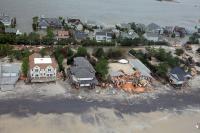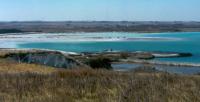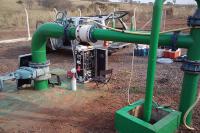-
New alloy to boost rare-earth elements production
Rare earths are a group of elements critical to electronics, alternative energy, and other modern technologies. Modern windmills and hybrid autos, for example, rely on strong permanent magnets made with the rare earth elements neodymium and dysprosium. Yet there is no production occurring in North America at this time. Researchers have developed aluminum alloys that are both easier to work with and more heat tolerant than existing products. The alloys — which contain cerium — have the potential to jump-start the U.S. production of rare earth elements.
-
-
Cities can prepare for hurricane season by reforming shortsighted and outdated laws
In the past decade major storms have devastated U.S. coastal cities from Galveston to Atlantic City and New York. They also have ravaged inland capitals, including Baton Rouge, Richmond, and Montpelier. Ensuring that our cities have the legal infrastructure in place to build safer, more efficient, and more equitable neighborhoods and communities after storms is just as important as preparing homes and businesses to ride out those storms.
-
-
New USGS models help predict storm effects on beaches

As the 2016 hurricane season opens, weather forecasters, emergency managers and coastal residents have access to tools developed by the USGS which predict, more precisely than ever, where beach erosion and beachfront flooding will take place during hurricanes and other storms.
-
-
Appalachian coal ash rich in rare earth elements

In the wake of a 2014 coal ash spill into North Carolina’s Dan River from a ruptured Duke Energy drainage pipe, the question of what to do with the nation’s aging retention ponds and future coal ash waste has been a highly contested topic. A study of the content of rare earth elements in U.S. coal ashes shows that coal mined from the Appalachian Mountains could be the proverbial golden goose for hard-to-find materials critical to clean energy and other emerging technologies.
-
-
Groundwater extraction contributes less to sea level rise than previously thought

Groundwater extraction and other land water contribute about three times less to sea level rise than previous estimates, according to a new study. The study does not change the overall picture of future sea level rise, but provides a much more accurate understanding of the interactions between water on land, in the atmosphere, and the oceans, which could help to improve future models of sea level rise.
-
-
Changing climate threatens World Heritage, tourism sites
Climate change is fast becoming one of the most significant risks for World Heritage sites across the globe. Many World Heritage sites, designated for their global significance and universal value to humankind, are major tourist destinations. Some are among the most iconic places on Earth.
-
-
Muslim students in Switzerland must shake female teachers’ hands
Muslim students in Switzerland’s Basel Country can no longer refuse to shake a female teacher’s hand on religious grounds, according to the canton’s office of education, culture, and sport. If they refuse, they would face a fine of up to $5,000. The canton’s authority added that the public interest outweighed “considerably” the private interests of the pupils. This public interest included equal treatment of men and women, the integration of foreigners into Swiss society, and a well-organized school system. In addition, shaking hands was an important social gesture for one’s future career, the educational authority said in its statement.
-
-
Cotton candy machine inspires lighter bullet proof vests, and more

It is “boots on the ground” in this Harvard lab where the researchers are on a mission to protect U.S. troops on the battlefield. Researchersare developing next generation nanofibers at the Harvard Materials Research Science and Engineering Center (MRSEC). The researchers draw their inspiration from the cotton candy machine. They use their own version of that technology to spin a wide range of polymers, both natural and synthetic, into new fabrics and materials for military use.
-
-
Better understanding of how climate change threatens agriculture
Climate change expected over the next decade may cause food production in a key agricultural region of Brazil to decline by up to 13 percent. The decline reflects both reductions in crop yield — how much is produced per area harvested — and how crop failures and farmers’ decisions together lead to cultivating less land and growing only one crop in a season instead of two. “Some amount of climate change is inevitable,” says a researcher. “So we’re asking, How vulnerable is the agricultural system, and what are the remedies?”
-
-
Trump-owned resort cites sea level rise in application for seawall permit
Donald Trump may believe that the scientific evidence about global warming is a “hoax,” or the result of a Chinese plot to undermine the American economy, but the professional managers of his coastal properties believe that global warming is real, and that one of its consequences – sea level rise – poses a real threat to the Trump properties they manage.
-
-
Speedy terahertz-based system could detect explosives
Terahertz spectroscopy, which uses the band of electromagnetic radiation between microwaves and infrared light, is a promising security technology because it can extract the spectroscopic “fingerprints” of a wide range of materials, including chemicals used in explosives. Spectroscopic system with chip-scale lasers cuts detection time from minutes to microseconds.
-
-
Changing land uses in California will drive water needs beyond available supply
If past patterns of California land-use change continue, projected water needs by the year 2062 will increase beyond current supply. If historical trends of land use changes to or from urban, agricultural or other uses continue, the result will be increased water-use demand beyond what existing supplies can provide. Large uncertainties associated with weather and climate variability have the potential to exacerbate the problem.
-
-
Frequency of extreme heat waves on the increase in Africa -- could soon occur annually

Climate analysis shows that periods of unusually hot weather are on the rise for one of the most vulnerable continents to climate change, even if the increase in global average temperature remains at a modest level.Longer, hotter, more regular heat waves could have a damaging effect on life expectancy and crop production in Africa warn climate say scientists.
-
-
With drought easing, California rolls back water conservation rules
California announced on Wednesday that it was rolling back mandatory water conservation rules which were put in place at the height of a 4-year drought. The decision to roll back the restrictions came after water conditions in many parts of the state have improved as a result of a wet winter.
-
-
DHS S&T launches interactive Year in Review
Science and Technology Directorate’s (S&T) has launched its annual Year in Review — an interactive, Web-based report providing a guided tour of S&T’s successes and developments in 2015.S&T’s Year in Review includes highlights from thirty-seven of S&T’s projects.The review includes an introduction on programs and initiatives and further discusses how S&T meets its mission and fits into the larger mission of the department.
-
More headlines
The long view
New Technology is Keeping the Skies Safe
DHS S&T Baggage, Cargo, and People Screening (BCP) Program develops state-of-the-art screening solutions to help secure airspace, communities, and borders
Factories First: Winning the Drone War Before It Starts
Wars are won by factories before they are won on the battlefield,Martin C. Feldmann writes, noting that the United States lacks the manufacturing depth for the coming drone age. Rectifying this situation “will take far more than procurement tweaks,” Feldmann writes. “It demands a national-level, wartime-scale industrial mobilization.”
How Artificial General Intelligence Could Affect the Rise and Fall of Nations
By Barry Pavel et al.
Visions for potential AGI futures: A new report from RAND aims to stimulate thinking among policymakers about possible impacts of the development of artificial general intelligence (AGI) on geopolitics and the world order.
Smaller Nuclear Reactors Spark Renewed Interest in a Once-Shunned Energy Source
By David Montgomery
In the past two years, half the states have taken action to promote nuclear power, from creating nuclear task forces to integrating nuclear into long-term energy plans.
Keeping the Lights on with Nuclear Waste: Radiochemistry Transforms Nuclear Waste into Strategic Materials
By John Domol
How UNLV radiochemistry is pioneering the future of energy in the Southwest by salvaging strategic materials from nuclear dumps –and making it safe.
Model Predicts Long-Term Effects of Nuclear Waste on Underground Disposal Systems
By Zach Winn
The simulations matched results from an underground lab experiment in Switzerland, suggesting modeling could be used to validate the safety of nuclear disposal sites.
